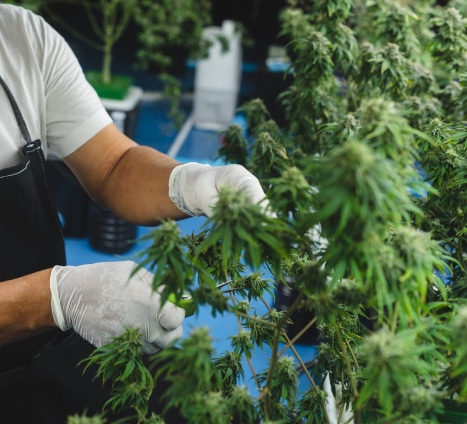Cannabis License Regulations in West Virginia
Understanding how to get a cannabis license in West Virginia is crucial for businesses and individuals interested in entering the state’s medical cannabis industry.
West Virginia legalized medical marijuana in 2017, but the landscape of cannabis laws, including licensing for cultivation, manufacturing, and distribution, is complex and requires detailed navigation.


Since 2017, West Virginia has permitted the use of medical cannabis under Senate Bill 386, known as the West Virginia Medical Cannabis Act. The Act allows residents with certain medical conditions to use medical marijuana, regulated by the West Virginia Office of Medical Cannabis (OMC).
The West Virginia Department of Medical Cannabis oversees the licensing process for cannabis business operations.
Types of Cannabis Licenses in West Virginia
The types of cannabis licenses available in West Virginia are central to the operational framework of the state’s medical cannabis industry. These licenses cover the entire spectrum of cannabis operations, from cultivation to distribution, ensuring that every aspect of medical cannabis is regulated, safe, and compliant with state laws.
Here’s an expanded look into each license type based on the general guidelines provided by the West Virginia Office of Medical Cannabis and the regulatory framework:
Cultivation License
Cultivation licenses allow entities to grow cannabis plants for medical use. Entrepreneurs interested in cannabis cultivation must adhere to West Virginia’s regulations, including compliance with state security, environmental, and health standards.
This includes securing a facility that meets the stringent requirements for growing medical-grade cannabis, such as proper lighting, temperature control, and security measures to prevent unauthorized access and diversion.
Manufacturing License
Manufacturers process raw cannabis into various medical products such as oils, tinctures, and topicals. A manufacturing license requires the applicant to have facilities equipped with the necessary technology and equipment for processing cannabis safely and hygienically. Compliance with state regulations on product safety, labeling, and potency is essential.
Distribution License
This license pertains to the transportation of medical cannabis and cannabis products between licensed facilities, such as from cultivation centers to dispensaries. Distributors must ensure that transportation is secure and that all cannabis products are tracked, adhering to state guidelines to prevent diversion and ensure product integrity.
Lab Testing License
Lab testing facilities play a critical role in the medical cannabis industry by ensuring the safety and potency of cannabis products. Labs test for contaminants, potency, and consistency. A lab testing license requires the facility to meet high standards of scientific rigor and integrity, with personnel having the necessary expertise to conduct accurate and reliable tests.
Retail License
Retail licenses, or dispensary licenses, allow for the sale of medical cannabis products directly to patients and caregivers. Dispensaries must create a secure and welcoming environment for patients, comply with state regulations on sales, and ensure that all staff are trained on the medical use of cannabis. Dispensaries also play an educational role, providing information on the safe use of cannabis.
Cannabis Event Organizers and Microbusiness
Specific details about licenses for event organizers and microbusinesses are not explicitly defined but would follow the general framework of requiring compliance with state regulations, security measures, and operational capabilities.
Additional Licenses
Other licenses might include those for cannabis event organizers, which would regulate events promoting medical cannabis use, and microbusiness licenses, which could offer opportunities for smaller-scale operations encompassing cultivation, manufacturing, and retail within a single entity.
While specific details on these licenses were not provided, they would likely require adherence to a similar set of standards and regulations to ensure public safety and compliance with state laws.
Each license type has specific application requirements, fees, and renewal processes, as outlined by the West Virginia Office of Medical Cannabis. Applicants must provide detailed plans for their operations, including security measures, product tracking systems, and compliance protocols to meet state regulations. Applicants must submit financial statements demonstrating their financial stability as part of the application process.
The goal of these licenses is to ensure that all entities involved in the medical cannabis industry operate responsibly, safely, and in the best interest of patients needing medical cannabis for therapeutic purposes.
For the most current and detailed information on applying for these licenses and the specific requirements for each, it is recommended to consult the Office of Medical Cannabis directly.
How to Obtain a Cannabis License in West Virginia?
Obtaining a cannabis license in West Virginia involves several steps, including demonstrating good moral character, financial backing, and the operational capability to adhere to state cannabis regulations.
Applicants must provide detailed information about their business plans, security measures, and compliance with state laws. The West Virginia Bureau of Health has set forth requirements for residency, moral character, and financial fitness, among others, for applicants.
For Cannabis Patients
A qualifying medical condition is necessary to obtain a medical marijuana card. Once approved, patients will receive a medical card (medical marijuana card), allowing them legal access to medical marijuana.
Your Cannabis Business Deserves the Best
Remaining Compliant with West Virginia Regulations
Compliance involves maintaining effective control to prevent diversion, adhering to all applicable laws, and reporting any changes in facts or circumstances reflected in the license application. The state emphasizes security, tracking, recordkeeping, and surveillance systems for cannabis operations.
To ensure ongoing compliance, you must conduct business legally. This includes being mindful of selling your products to qualified consumers. In West Virginia, medical marijuana is legal for those with a medical marijuana card.
A medical cannabis recommendation from a qualified physician is necessary for obtaining medical marijuana. Providing medical records demonstrating a qualifying medical condition is crucial for the medical marijuana card application.
Note that only those with serious medical conditions, like post-traumatic stress disorder, are eligible for a medical marijuana card. Those facing financial difficulties may apply for a financial hardship waiver for their medical marijuana card.
Risk and Compliance Factors
The cannabis business in West Virginia involves navigating legal complexities and operational challenges, including maintaining compliance with evolving regulations and managing security and diversion prevention measures.
Final Thoughts
Entering the medical cannabis industry in West Virginia requires careful planning and adherence to the state’s regulatory framework. Prospective licensees should stay informed on legislative updates and ensure all aspects of their operations comply with state guidelines.
Legal References and Citations
Entering the medical cannabis industry in West Virginia requires careful planning and adherence to the state’s regulatory framework. Prospective licensees should stay informed on legislative updates and ensure all aspects of their operations comply with state guidelines.
Legal References and Citations
- West Virginia Medical Cannabis Act (Senate Bill 386)
- Office of Medical Cannabis (OMC) Regulations
Additional Resources
FAQ Section
Q: How do I apply for a medical cannabis license in West Virginia?
A: Visit the Office of Medical Cannabis website for detailed application procedures and requirements.
Q: What types of medical cannabis licenses are available in West Virginia?
A: West Virginia offers licenses for cultivation, manufacturing, distribution, lab testing, retail, and potentially more, each with specific requirements.
This guide aims to provide a foundational understanding of the cannabis licensing process in West Virginia, emphasizing compliance, operational requirements, and the importance of staying informed on state regulations.